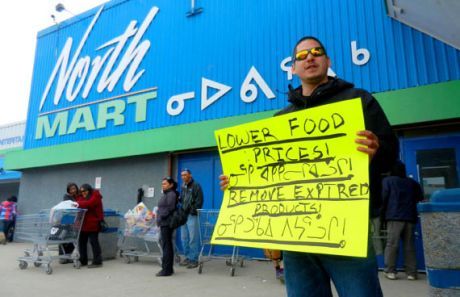Features
You are here
Northern food, northern hunger

February 25, 2015
You can eat nutritiously in the far North. If you’re a millionaire, that is. Chicken kiev perhaps? Chicken is a mere $65 a pound. Coleslaw on the side? That cabbage will cost you $28.
According to the Canadian Press:
- In 2014 the unemployment rate among Inuit in Nunavut was 16.5 per cent, double the average rate in the rest of the country.
- Percentage of the population receiving welfare: 49.1 — the highest in the country.
- Cost of two litres of orange juice at an Iqaluit grocer: $26.29.
- Cost for four litres of milk: $10.39, with a sign advising shoppers it would have been $20.91 without a federal subsidy.
- Average cost of chicken in Nunavut: $16 per kilogram.
- Average cost of chicken across Canada: $7 per kilogram.
- Average cost of 2.5 kilograms of flour in Nunavut: $13
- Average cost of 2.5 kilograms of flour across Canada: $5
- Percentage of Inuit households considered food insecure: 70. That's eight times the national average.
Meanwhile a family of four on social assistance in Nunavut receives about $275 to $325 a week for food.
Helping our Northern Neighbours is a popular charity, whose web page states, “While a major change in the system at a governmental level needs to happen, this will take time, and in the meantime we would like to do something to help. Some of us in the south decided we would like to share with our neighbours in the north by sending boxes of food and other items.” It is likely the case that, as with other charities where there are no tax write-off incentives, those making donations have just enough to live on themselves.
In 2012, Nunavut residents protested outside their local stores, and some reported price reductions as stores were shamed into cutting back on their price gouging — at least temporarily. One resident reported on Facebook: “Bought an avocado for 1.99(was 5.99 for one) green onions 2.19, cranberry juice 4.99 from 18.99.” The protests exposed that North West Co’s food stores increased their profits by five per cent that year, in part due to “strong food sales growth in our northern markets.”
The Tory connection
Harper chose Inuk member Leona Aglukkaq to be his environment minister in 2013. When first elected in 2008 as the Tory MP for Nunavut, she was as minister of health, making her the first Inuk in Canadian history to be named to the federal cabinet. While holding the health portfolio, Aglukkaq gave signals of her future abysmal role as environment minister when she refused to sign the Vienna Declaration on drug policy reform—which supported harm reduction strategies like safe needle exchange programs and safe injection sites. She has shown no support for the Idle No More movement, calling on Chief Theresa Spence to give up her hunger strike in December 2012. It is typical of the ruling class to find a member of an oppressed group to do the bidding of the 1%, and the Tories and corporations could not have done better than Aglukkaq. (she’s up there with Phil Fontaine who, after heading the Assembly of First Nations, sat on a number of corporate boards and is now a shill for oil companies).
Under pressure from northern residents, the government introduced the “Nutrition North,” a food subsidy program. Even the auditor general has concluded that it is not working.So what did Aglukkaq do when opposition critics went after this program during question period in December 2014, and asked her what she was doing about APTN reports of a Nunavut elder rummaging through a dump for food? She decided to read a newspaper, to keep up on the news. She later admitted this was “a bad idea.” But it gets worse. In February 2015, Aglukkaq stated that it is the responsibility of food retailers to administer the subsidy program. Talk about the fox watching the hen house. There is nothing in this arrangement that would stop retailers from doing what they want with the subsidy.
Alternatives
In an op-ed for Ricochet, postal worker Mike Palecek says “With the largest logistics and retail network in the country, the Crown corporation could be leveraged to meet social needs.” He cites a former program called “Food Mail”, through which retailers sent food through Canada Post at a cost of 80 cents per kilogram, vs. $13 today. Palecek suggests expanding this program, to keep shipping costs in check, “but also allow residents to order bulk food directly with subsidized shipping. This would dramatically reduce the cost of nutritious food in isolated communities.” But, as Palecek points out, the Tories are more interested in giving subsidies to their corporate friends than in sustaining public institutions like Canada Post. Just look at the move to eliminate door-to-door mail delivery.
Stopping not only Harper but the entire neoliberal agenda that undercuts public services will be needed to address a myriad of social problems, including exorbitant food costs in the north. As with climate justice, this is a great opportunity for residents of north and south, Indigenous and non-Indigenous, to sustain a joint campaign that would ensure residents everywhere have access to affordable, nutritious food.
Section:









